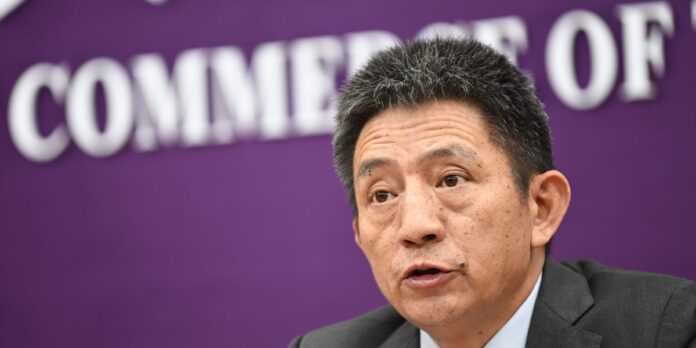China will no longer claim the benefits available to developing nations at the World Trade Organization, removing a point of contention with the US that’s been a barrier to their agreement on reforming the global arbiter of commerce.
Premier Li Qiang announced Tuesday in New York that the country will stop seeking new “special and differential” rights in any current and future WTO negotiations, according to state-run Xinhua News Agency and a statement from the WTO’s head on X. Li is currently in the US to attend the United Nations General Assembly.
WTO Director General Ngozi Okonjo-Iweala welcomed the decision on X, calling it “a culmination of many years of hard work” and thanking China’s leadership.
The gesture is significant at a time when higher U.S. tariffs are forcing China to divert ever more of its exports to rising economic powers from Latin America to Africa and Southeast Asia, a push that’s starting to meet resistance around the world.
And as Beijing looks to negotiate a more lasting trade deal with the U.S., it’s also likely an effort to curry favor with President Donald Trump, who has long bristled at the designation he’d said was unfairly applied to the world’s second-biggest economy.
The question of China’s status has also been one of the issues holding up negotiations about reforming the WTO.
Earlier this year, trade chiefs from across the Asia-Pacific region, including the U.S. and China, acknowledged the importance of the organization for advancing trade issues and the need for its rules while calling for “meaningful, necessary, and comprehensive reform to improve all its functions.”
Developing nation status is self-declared and provides various benefits to WTO members, including longer time frames to implement agreements. China has long called itself the world’s largest developing state, emphasizing that position to claim a leading role for other emerging countries.
Despite China’s four-decade transformation that’s turned it into the world’s biggest trading and manufacturing economy, the UN still classifies it as a developing nation. It ranks well outside the top 50 in the world by gross domestic product per capita, according to the International Monetary Fund, below Serbia and just ahead of Montenegro and Turkmenistan.
In 2019, Foreign Minister Wang Yi said demands that China declare itself a “developed” nation in international affairs represented a form of inequality. And earlier this year, he described his country as a “natural member” of the Global South because of a “shared common history of fighting colonialism and hegemony and a common mission of development and revitalization.”
While no longer eligible for the special treatment, China’s status as a developing nation won’t change, Han Yong, a Ministry of Commerce official in charge of relations with the WTO, told reporters in Beijing on Wednesday.
Wendy Cutler, a senior vice president at the Asia Society Policy Institute and veteran U.S. trade negotiator, said the announcement is “years too late.”
“In light of the absence of a WTO negotiating agenda and the slow pace of its reform efforts, the announcement—while welcome—will have little practical effect,” said Cutler. But it “will help Beijing make the case of its enduring commitment to the multilateral trading system, in sharp contrast to Washington which is holding up its dues to the organization.”
Beijing has been positioning itself as a champion of developing nations, and portrayed the decision as an extension of that effort. China has sought to counter the U.S.-led global order in part by courting the Global South.
China’s move not to claim the benefits “is an important measure to safeguard and strengthen the multilateral trading system” and will highlight “China’s role as a major developing country,” the Ministry of Commerce said in a statement.
It’s also “an important action to implement the Global Development Initiative and the Global Governance Initiative,” it said, referring to two policy proposals from China in recent years to reform world affairs. The announcement from Li came at at event on the Global Development Initiative, according to Xinhua.
The U.S. has been critical of China continuing to claim developing status. Trump said in 2019 during his first term that “the United States has never accepted China’s claim to developing-country status, and virtually every current economic indicator belies China’s claim.”
The U.S. Trade Representative and the White House didn’t immediately respond to a request for more information on the announcement.
The question of China’s status extends beyond global trade because it’s a big sticking point for climate negotiations as well.
Developed states are supposed to contribute to a $100 billion a year fund to help emerging nations pay for climate fixes. But although China is now the world’s largest emitter, its designation means it doesn’t pay into the fund—a stance criticized by both Europe and the U.S.
Despite the change announced by China, it’s unlikely to defuse a host of tensions between Beijing and Washington on trade and other issues. Chinese exports are still growing strongly, rising almost 6% in the first eight months of this year to hit a record for that period.
China’s chief trade representative, Li Chenggang, attacked U.S. policies on Wednesday just hours after the WTO announcement with a warning that “hegemony, unilateralism, and protectionism are rampant.”
“Currently, the rules-based multilateral trade system faces severe challenges,” Li, who’s also a vice commerce minister, told reporters in Beijing. “A certain country has launched a trade war and then a tariff war, severely damaging the legitimate interests of WTO members and severely disrupting the global trade order, and bringing uncertainties and instability to the global economy.”


